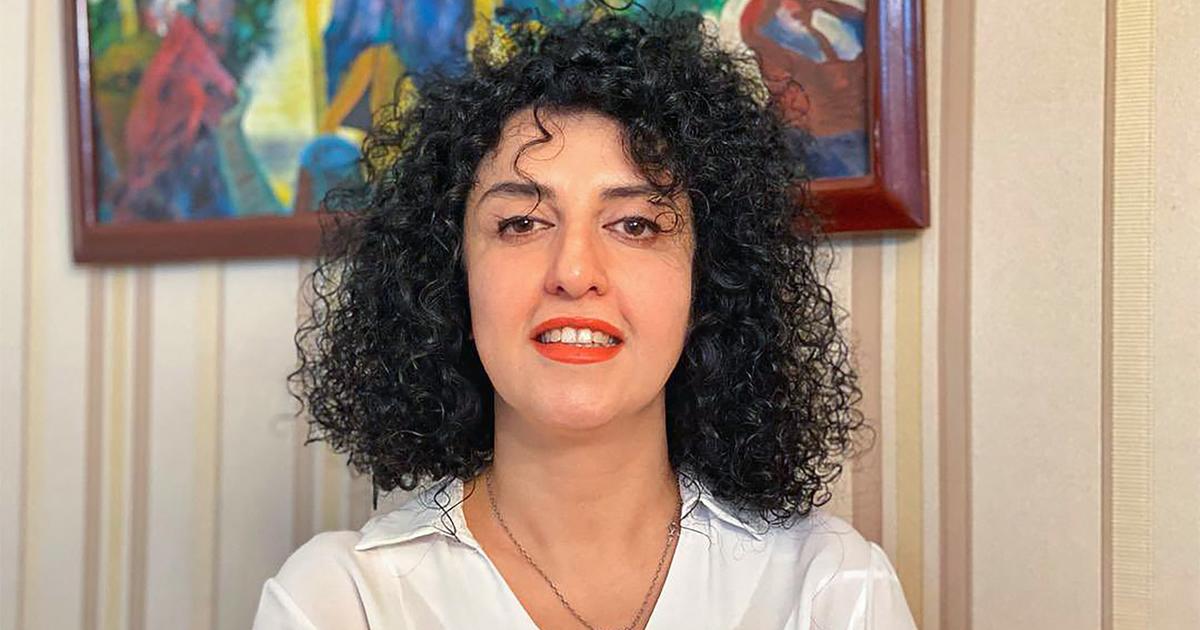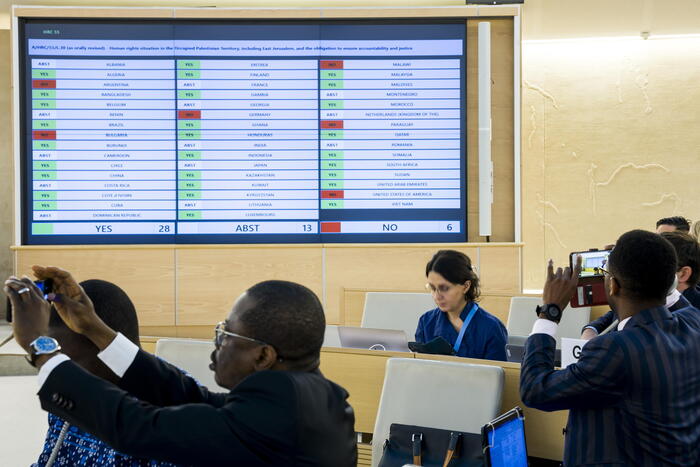The Belgian aid worker Olivier Vandecasteele has been sentenced to 28 years in prison in Iran for charges that are still unknown, but that the Minister of Justice, Vincent Van Quickenborne, assured this Wednesday in the Parliament of his country are based on "a series of crimes invented".
Vandecasteele's is not a unique case.
Dozens of citizens of Europe and other Western countries are imprisoned in Iran and the number has not stopped growing since the protests broke out in mid-September over the death of Mahsa Amini, the young woman arrested by the morality police accused of wear the veil badly.
There is no official number of Europeans imprisoned in Iran.
Iranian authorities can take months to confirm an arrest, and their home country governments often hold back from making them public, hoping that discreet efforts will be more effective in securing their release.
The Spanish MEPs Francisco José Millán and Gabriel Mato asked the high representative for EU Foreign Policy, Josep Borrell, about the number of Europeans detained in Iran, but his answer, dated the 13th, does not provide any data: he alleges that it is not for him to divulge them.
The sentence for the Belgian citizen, the last known, is even higher than the 20 years that an Antwerp court imposed on Assadollah Assadi, the Iranian diplomat accused of preparing a bomb attack against a meeting near Paris of an opposition group to the regime of the ayatollahs
Last week, the Belgian Constitutional Court had suspended an agreement between Brussels and Tehran designed to exchange the two prisoners, according to the Belgian opposition and Iranian dissidents in exile.
Vandecasteele's family has no doubt that the Iranian authorities captured him with the intention of exchanging him for the diplomat: the 41-year-old aid worker was detained in Tehran when he returned last February to collect his belongings, after having worked in the country for various NGO between 2015 and 2021. A few days before Assadi's sentence had been known.
Sweden has experienced a similar case.
Last July, a court in Stockholm, applying the principle of universal jurisdiction, sentenced Hamid Nouri, a 61-year-old former Iranian officer, to life imprisonment for the killing of political prisoners in an Iranian jail in 1988. The Speaker of Parliament Iranian attacked Swedish justice and demanded the release of the former jailer.
A few days later, Tehran announced the arrest of a Swedish tourist, who had allegedly been in Israel, accused of espionage.
Last October, the Center for Human Rights in Iran (CHRI), based in New York, estimated at least 20 Westerners imprisoned in the country, of which 14 have dual nationality, for which reason Tehran does not recognize their status. of foreigners nor does it allow consular assistance to be provided to them.
This list is incomplete, since it does not include the nine Europeans whose arrest was reported on September 30 by the Iranian Ministry of Intelligence and National Security, nor the 40 foreigners whose arrest was revealed on November 22 by the spokesman for the Tehran judiciary, without detailing their nationalities.
Known cases of EU citizens affect France (7), Sweden (5), Germany (4), Austria (2), Spain (2), Belgium (1), the Netherlands (1) and Poland (1).
In addition, there are Americans, British, Canadians or Swiss.
Santiago Sánchez, in a video image of his visit to Sulaymaniyah, in Iraq, on September 28.
PA
Santiago Sánchez Cogedor, 41, from Madrid, was arrested in Iranian Kurdistan on October 2.
He had left from San Sebastián de los Reyes (Madrid) on January 8 and he intended to travel 6,800 kilometers on foot until he reached the World Cup in Qatar.
The Spanish adventurer visited the tomb of Mahsa Amini in Saqqez and took a photo of her, which was enough for him to be arrested as an alleged agent of a foreign secret service.
It is the same accusation that weighs on the Galician Ana Baneira, 24, an environmentalist and feminist, who left the Santiago de Compostela airport (A Coruña) on June 9 with the intention of traveling for six months through the Middle East and Central Asia. .
On November 10, it was learned that the activist had been detained during a women's demonstration in Iran.
In the case of the two Spaniards, Tehran has not shown interest in exchanging them for any prisoner.
But in the conversation that the Spanish Minister of Foreign Affairs, José Manuel Albares, had with his Iranian counterpart, Hossein Amirabdollahian, on November 12, the latter criticized the "unconstructive measures" taken by European countries in response to the protests in Iran and accused EU officials of “paying more attention to their partisan goals than to the interests of their countries”.
According to the note released by the Iranian Foreign Ministry, Albares concluded by demanding the release of the two imprisoned Spaniards.
Iranian Foreign Minister Hossein #Amirabdollahian and his Spanish counterpart, José Manuel Albares Bueno, discussed regional and bilateral issues on the phone.
https://t.co/qHFLbVrnSQ pic.twitter.com/NTv5Q9D90Y
— Iran Foreign Ministry 🇮🇷 (@IRIMFA_EN) November 12, 2022
Every time the European foreign ministers adopt new sanctions against Tehran, extending the blacklist of people and entities that are prevented from entering the EU and whose assets are frozen, as happened last Monday, hangs over their heads sword of Damocles from their own fellow citizens imprisoned in Iran.
European diplomatic sources have no doubt that the accusations against the detained Europeans are almost always false and that they are "hostages with which Tehran presses to stop the imposition of sanctions";
for human rights violations or for the supply of drones used by Russia to attack Ukraine.
The arrests also pursue, add the same sources, a propaganda objective: to demonstrate that the protests that have shaken the country since Amini's death are directed from abroad, as the regime intends to show.
Official Iranian television broadcast on October 6 the
confession
of two French prisoners, the trade unionist Cécile Kohler and her husband, Jacques Paris, in which they claimed to be spies.
The French government described the broadcast as "disgusting, unacceptable and contrary to international law."
Iranian state media on Thursday released a trailer of the forced confessions of French detainees Cécile Kohler, a @FnecFpFO union official, and her husband, in which they say they were agents of the French intelligence service, and were sent to Iran to prepare grounds for riots.
pic.twitter.com/8CrJlTvzPu
— Iran International English (@IranIntl_En) October 6, 2022
Most of the European prisoners have not been detained by the Iranian Ministry of the Interior, but by the secret service of the Islamic Revolutionary Guards, a State within a State, or by the Ministry of Intelligence and National Security, making it even more difficult negotiations for his release.
The Spanish ambassador in Iran, Ángel Losada, was able to visit Santiago Sánchez in the Saqqez prison, 600 kilometers from Tehran, on the 6th, before he was transferred to the capital.
In addition to bringing him letters and clothes, the visit allowed the man from Madrid to speak for 11 minutes, in the presence of an interpreter, with his parents.
On the other hand, the Iranian authorities have put up more obstacles to visit Ana Baneira, with whom the Spanish ambassador has spoken by telephone.
Although these steps have served to reassure the families about the state of health of both, the Spanish Government fears that her release will not be an easy or quick process.
Relatives of four of the Europeans imprisoned in Iran sent a letter to the high representative last September in which they criticized the passivity of the EU regarding the situation of their relatives.
Sources close to Borrell allege that governments prefer to manage crises directly;
like the one in Rome, which on November 10 achieved the release of a 30-year-old Italian blogger, in what constituted the first diplomatic success of the far-right Giorgia Meloni.
Despite this, the EU Foreign Affairs Council discussed the situation last Monday and urged the Iranian regime to "end the worrying practice of detaining innocent foreign civilians for the purpose of political gain."
A veteran diplomat recalls that it was precisely with a hostage taking, those of the US Embassy in Tehran,
Follow all the international information on
and
, or in
our weekly newsletter
.
Subscribe to continue reading
Read without limits
Keep reading
I'm already a subscriber

/cloudfront-eu-central-1.images.arcpublishing.com/prisa/7H2CBRHTUZHVRJKZ3JW56KQA7E.jpg)









/cloudfront-eu-central-1.images.arcpublishing.com/prisa/KMEYMJKESBAZBE4MRBAM4TGHIQ.jpg)


